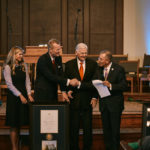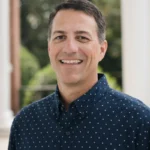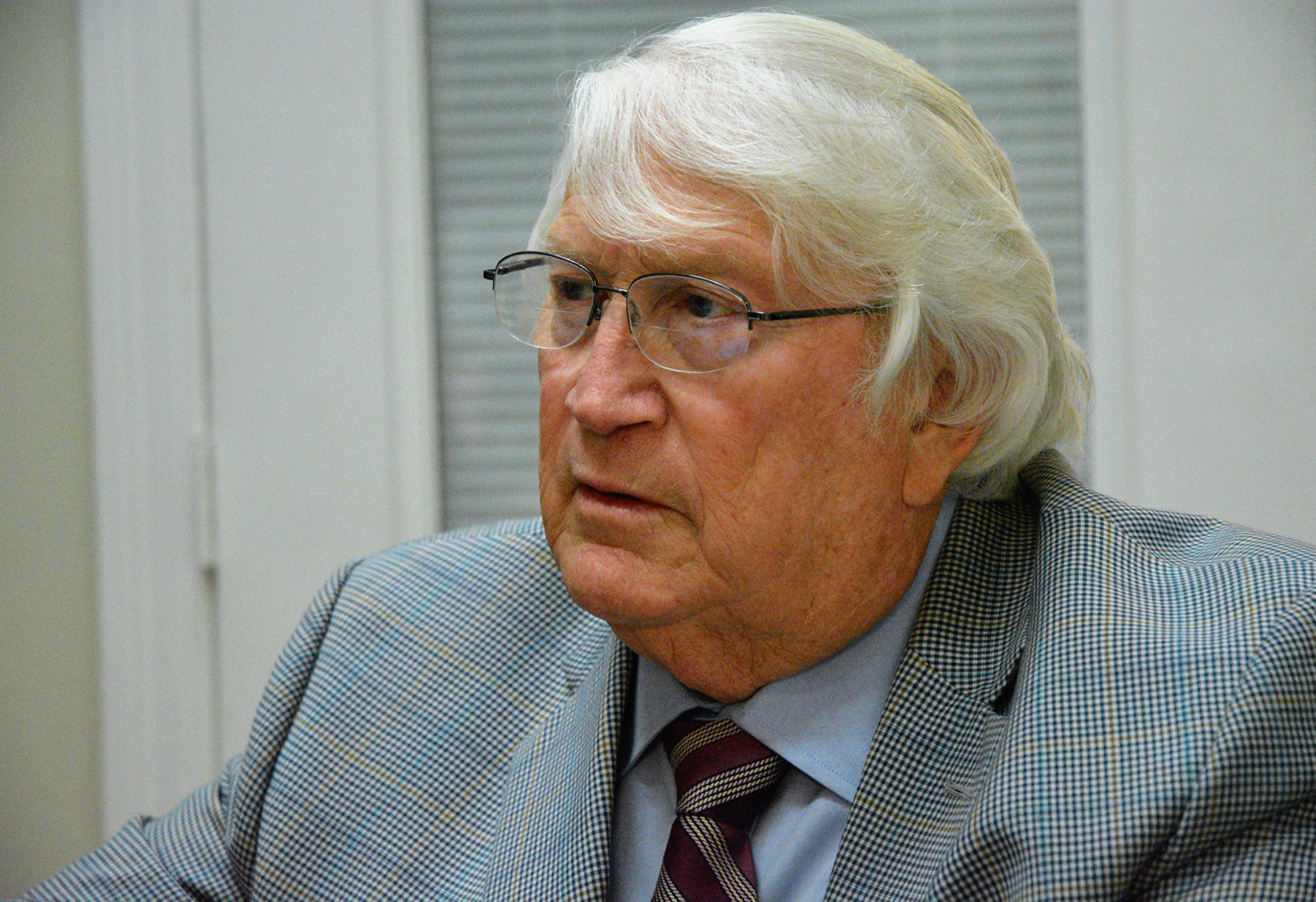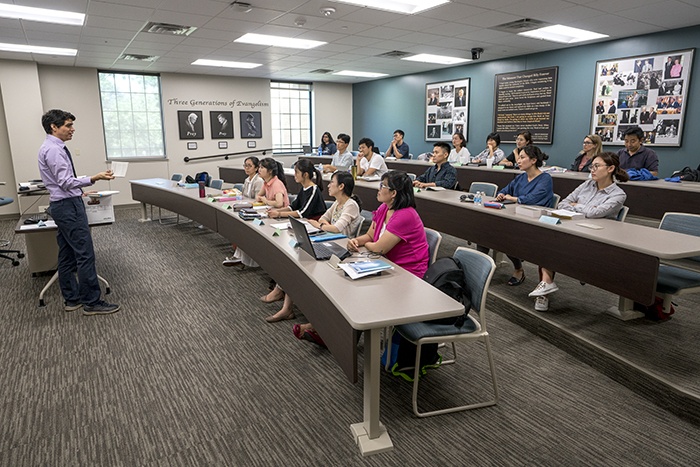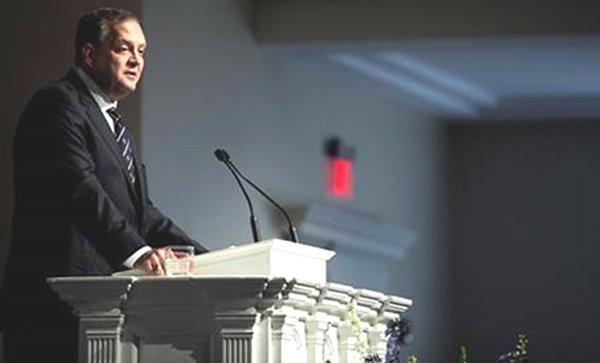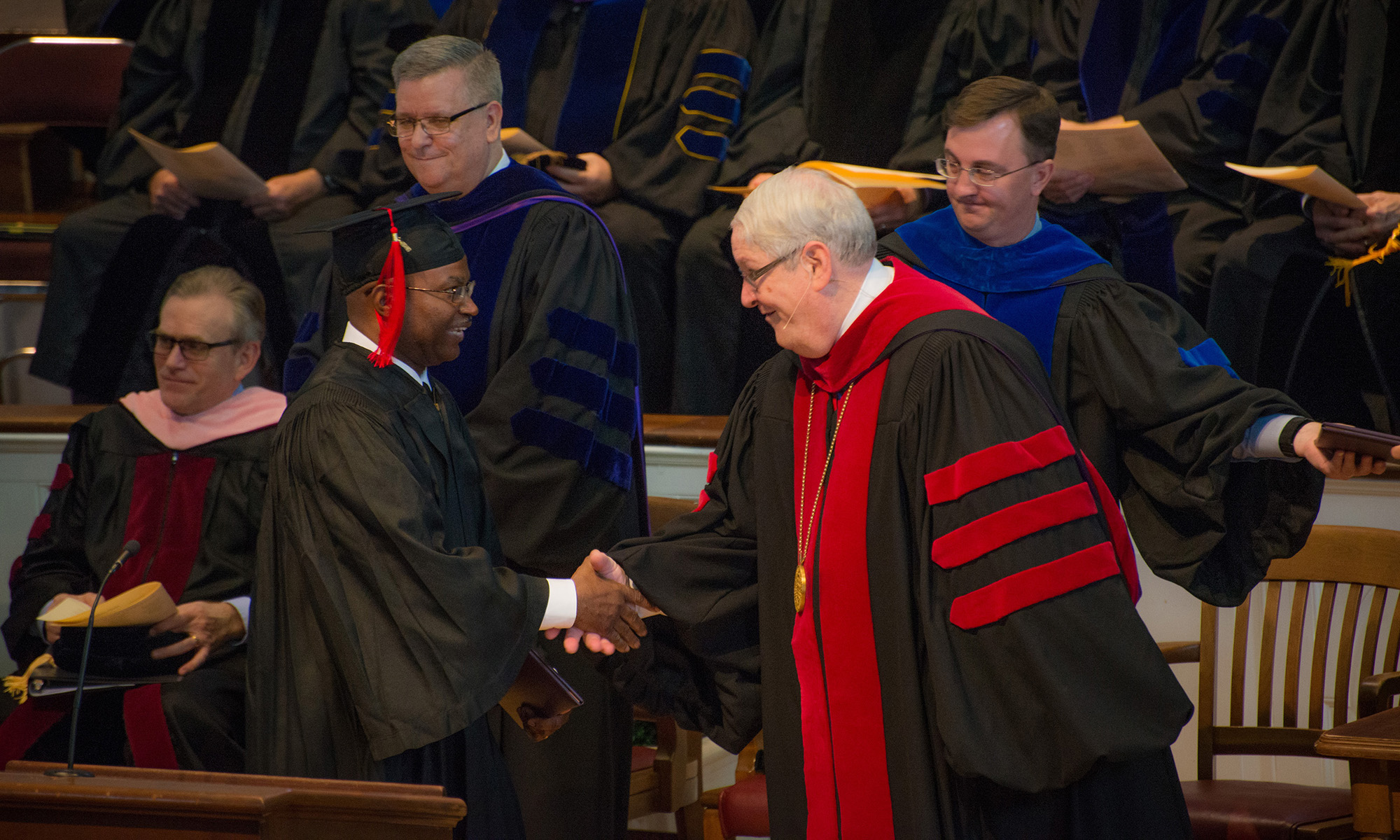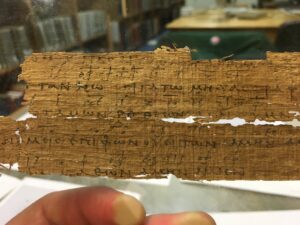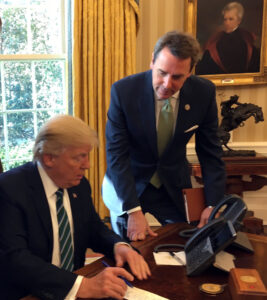
Jump to:
Southern Seminary Sees Record Enrollment, Program Expansion
Southwestern Seminary—Text-Driven, Evangelism-Focused
New Orleans Seminary: Answering God’s Call
A Vision for the Future: Golden Gate Seminary Moves Its Campus, Changes Its Name
Southeastern Baptist Theological Seminary: Going to the Culture
Midwestern’s Compelling Motto: “For the Church”

Southern Seminary students (left to right) Joel Peña, Jairo Namnún and Erick Jimenez, all from the same church in the Dominican Republic, sit together at Towery Plaza. Photo by Emil Handke.
The Southern Baptist Theological Seminary experienced many blessings in the 2014–2015 academic year ranging from record enrollment, prestigious faculty awards, and the launching of new programs.
The seminary saw its largest enrollment in the institution’s history, with a non-duplicating head count of 5,067 students—3,546 in the seminary and 1,235 in Boyce College, the seminary’s undergraduate school, and 286 visiting students—surpassing the previous record of 4,792.
Of this total, 1,985 were enrolled in the Master of Divinity (MDiv) program, the largest number of students seeking that degree among all Association of Theological Schools (ATS) member institutions.
More than six hundred students graduated from the seminary in 2015.
“These enrollment numbers represent an incredible stewardship and a sign of God’s good pleasure,” said Seminary President R. Albert Mohler Jr.
“We should note that these numbers represent the largest number of students studying for the pastorate gathered at any one institution at any single time in the history of the Christian church. Above all else, this is cause for enormous thanksgiving for the blessing of God. We also thank God for the vitality of an institution, founded in 1859, that is experiencing such growth and momentum in the twenty-first century.”
A recent report from ATS ranked Southern Seminary fourth among peer institutions for producing faculty doctorates in the accreditation agency’s member schools, trailing only Princeton Theological Seminary, Harvard, and University of Toronto. The report noted that 103 faculty members teaching in ATS-accredited institutions listed Southern Seminary as the school where they earned their doctorate.
Members of the faculty published more than twenty books in 2015, including Mohler’s latest book, We Cannot Be Silent. Released by Thomas Nelson, the book examines the rise of the homosexual movement, the path to same-sex marriage, the emergence of transgenderism, and the sexual revolution’s imperilment to religious liberty. The book resulted in more than fifty news media interviews, including three appearances on CNN, The Washington Post, Religion News Service, The Atlantic, “The Eric Metaxas Show,” and “The Michael Medved Show.”
For his “significant efforts in publicly promoting and defending religious liberty,” Mohler received the 2015 Edwin Meese III Originalism and Religious Liberty Award from the Alliance Defending Freedom, May 15.
Kevin Smith, assistant professor of Christian preaching at Southern, was elected president of the Kentucky Baptist Convention in November. Smith, who is also teaching pastor of Highview Baptist Church in Louisville, is the first African American to serve in the KBC’s top post.
A record 2,300 guests attended the Association of Certified Biblical Counselors conference, “Homosexuality: Compassion, Care, and Counseling for Struggling People” October 5–7. Among other topics, speakers discussed biblical care for those with same-sex attraction.
In 2015, the seminary the launched its new Global Campus, allowing students who serve in ministry around the world to complete the MDiv degree through distance learning. Its tagline, “From Louisville to Laos,” emphasizes Southern’s commitment to providing quality theological education wherever students are serving. The online learning department also received the Effective Practice in Online Learning Award from the Online Learning Consortium for its innovative approach to language learning.
Southern launched a new mobile app and redesigned website for President Mohler, offering users more convenient ways to engage with the evangelical leader’s content. In the past year, more than 1.6 million people visited AlbertMohler.com for his essays, daily podcast “The Briefing,” and “Thinking In Public” conversations, resulting in 6.4 million page views.
Boyce College, the undergraduate school of Southern Seminary, added a soccer program for the 2015–2016 school year, joining the school’s NCAA men’s basketball program. The soccer program began from the desire of three students to start the sport, not just as an athletic endeavor, but first as a means for ministry.
Mohler asks Southern Baptists to pray with him “that the ministry of Southern Seminary would be faithful to Scripture and the Great Commission as we seek to prepare God-called ministers to preach the Gospel in all of the nations of the earth.”
For more about Southern Seminary, check out: www.sbts.edu/2015review/.
Annie Corser is a writer and Master of Arts student at Southern Baptist Theological Seminary and is a member of Farmdale Baptist Church in Louisville, Kentucky.
Southwestern Seminary—Text-Driven, Evangelism-Focused
by Charles Patrick Jr

Student Thai Nguyen (far right) and Chair of Evangelism Matt Queen (center) pray with a man in front of his house just a few blocks from campus. Photo by Nic Hervey.
On his deathbed, the first president of Southwestern Baptist Theological Seminary (SWBTS), B. H. Carroll, implored, “Keep the Seminary lashed to the cross.” A century later, this imperative remains integral to the DNA of Southwestern as students and professors “Preach the Word, Reach the World.” The prayers and sacrificial gifts of churches through the Cooperative Program permit Southwestern to concentrate on what it is called to do, namely focusing on text-driven preaching, a text-driven lifestyle, a text-driven message, and taking the Gospel to a lost and dying world.
Evangelism is the heartbeat of Southwestern, as evidenced by students’ and professors’ passionate, active soul-winning for Christ. For the past several years, not a week has gone by where Southwesterners have not led one or more to Christ. Students create community intramural athletic teams with the goal of sharing the Gospel through sports. In one semester alone, students reported 387 professions of faith in neighborhoods around campus.
Last fall Southwestern held a Game Banquet to present the Gospel to men and boys interested in hunting in the Dallas/Fort Worth area.
This past March, students and professors continued a fifty-seven-year spring break tradition of preaching revival services across the US. To date, more than 14,100 people have been saved through this effort. The flames of soul-winning continue to burn brightly at Southwestern.
Southwestern embraces “Reach the World.” Viewing the world as our campus, students from forty-six countries are enrolled in the seminary’s residential or online programs. In addition, through its Global Theological Innovation program, Southwestern has partnered with ninety-three international seminaries to impact and influence theological education on a global scale, helping prepare, equip, and train the next generation of Christian leaders.
Southwestern annually sends mission teams to countries around the world. Last year’s trips to Madagascar and Thailand saw 347 and twenty-six professions of faith, respectively.
Last fall, Southwestern and Bibelseminar Bonn in Bonn, Germany, celebrated a ten-year partnership. Nearly fifty students have completed a Master of Arts in Theology degree and are now serving as pastors, missionaries, and teachers in Germany. These closest of relatives to our Anabaptist forefathers constitute a growing influence for Christ throughout Europe. Former SWBTS president Robert Naylor succinctly summed up Southwestern’s world outreach through its more than forty-five thousand graduates when he stated, “The sun never sets on Southwestern.”
Southwestern teaches the Word of God through music through the SBC’s only remaining School of Church Music. The school performed Handel’s Messiah for the nintey-fourth year and Gala for the thirteenth year. During this year’s Gala, Southwestern joined an exclusive group of roughly 175 schools in the world with the distinction of being an All-Steinway School, demonstrating a commitment to excellence by providing students and professors with the best equipment possible for the study of music.
Designed and based on understanding the Word of God better, Southwestern has one of the largest biblical archaeology departments in the US. In addition to its numerous collections housed in the Tandy Archaeology Museum—such as the Phillips Dead Sea Scrolls Collection—Southwestern has active field work at Tel Gezer, Israel; Kourion, Cyprus; and Egypt.
The vibrant Women’s Studies program continues to train the next generation of women to handle the Word of God and become teachers of women. Recently, Southwestern inaugurated and installed the Dorothy Kelley Patterson Chair of Women’s Studies, the first such academic chair in the evangelical world.
Excitement is in the air as Southwestern embarks on two new projects. First, Southwestern begins its seventh school this fall—the School of Preaching. The school focuses on teaching text-driven preaching and possesses eight full-time faculty with more than 270 years of combined preaching experience.
Second, construction has begun on Mathena Hall, which will house the Roy Fish School of Evangelism and Missions and the College at Southwestern. It will feature smart classroom facilities and the Chinese home of missionary Lottie Moon. The college is strategically placed with the School of Evangelism and Missions to provide enhanced opportunities for undergraduates to catch the vision of reaching the lost.
Southwestern invites you to see firsthand how God is working through students and professors. The souls of seven billion people drive us; your prayers, gifts, and God-called students fuel us.
Charles Patrick Jr. is vice president for strategic initiatives and communications at Southwestern Baptist Theological Seminary and is a member of Birchman Baptist Church in Fort Worth, Texas.
New Orleans Seminary: Answering God’s Call
by Marilyn Stewart

New Orleans Baptist Theological Seminary President Chuck Kelley, standing, greets students during his annual “Evening at Morning Call” event. The event offers students and their families the opportunity enjoy free beignets with Kelley and other faculty members in an informal setting. Photo by Boyd Guy.
Answering God’s call has been a part of the New Orleans Baptist Theological Seminary (NOBTS) DNA since the school opened its doors nearly one hundred years ago. Founded in 1917, in a city where Southern Baptists were few and churches were struggling, the seminary prioritized evangelism. The school has never wavered from its Great Commission underpinnings.
With new initiatives geared toward evangelism and practical ministry, the NOBTS commitment to share the life-changing Gospel of Jesus remains paramount. Personal evangelism, church revitalization, bivocational ministry support, compassion ministries, and apologetics are at the forefront as NOBTS equips students to carry the Gospel forward.
“We are passionately committed to getting our students church and ministry experience as they prepare,” said NOBTS President Chuck Kelley. “We are passionately committed to teaching them the Bible and giving them confidence in its historicity and truthfulness.”
Whether on the main campus, at an extension center, or in an online course, students are challenged to be active witnesses. The seminary’s newest course delivery method, the Entrust Mentoring Community, partners students with churches and para-church organizations for “hands-on” ministry and evangelism training. Not limited by location, students work with NOBTS-approved supervisors in varied settings.
The NOBTS commitment to local church ministry received a boost when a generous donation made full-tuition scholarships available for some students serving in church settings. Through the Caskey Center for Church Excellence, more than $1.1 million in student scholarships have been awarded to bivocational and smaller membership church ministers serving churches in Louisiana, Mississippi, and Alabama. Evangelism is a key component of the scholarship program. Caskey recipients participate in an evangelism practicum each semester. Through this initiative, more than 650 have come to faith in Christ.
Hand-in-hand with the commitment to evangelism and small church growth is a strong emphasis on church planting. For church planters like Carlos Rodriguez, an NOBTS Miami extension center student, the emphasis on evangelism is making an immediate impact. Of the 120-member congregation Rodriguez leads, more than half are persons he led to faith in Christ.
The seminary also encourages students to be involved in compassion ministries. In the aftermath of Hurricane Katrina in 2005, the seminary worked alongside thousands of Southern Baptist volunteers who flowed into the city to meet real needs of the city’s residents. NOBTS students remain actively involved in churches and organizations serving others, continuing to walk through “open doors” for the Gospel.
“We believe churches must engage the needs of the people in the communities they serve, and we are doing so as a seminary in our community,” Kelley said. “Undergirding it all, however, is the need to engage in Gospel conversations outside the walls of the church, a requirement for nearly all NOBTS students.”
Whether through social work or counseling, the NOBTS division of church and community ministries equips students to address individual, family, and social issues in biblically sound ways.
The Leeke Magee Christian Counseling Center provides counseling services to community members on a sliding scale fee basis while giving students hands-on counseling experience. Community-based ministry centered on Christ provides Gospel opportunities with those often outside the reach of the traditional church.
Carrying the Gospel outside seminary walls has proven fruitful and exciting through the Angola Extension Center at the Louisiana State Penitentiary. More than 250 men have trained for Gospel ministry inside the maximum security prison. These graduates have started twenty-eight churches and reached countless other inmates with the Gospel. Last August, the Angola Center marked its twentieth anniversary with the opening of a new eleven-thousand-square-foot facility with classroom space, computer lab, and library.
Clearing away obstacles to faith so the Gospel can take root is an important part of the evangelism process. The annual week-long Defend the Faith conference, sponsored by the Institute of Christian Apologetics at NOBTS, brings in leading apologists to help students learn how to answer the tough questions of the doubting world. With evangelism as its core goal, conference topics addressed how to answer atheists’ objections; science and miracles; foundations of biblical inerrancy; engaging other worldviews; and arguments for God’s existence.
In New Orleans, education and mission come together. Students who follow God’s call to NOBTS experience ministry opportunities, culture-engaging initiatives, and a biblically-sound theological education. They leave equipped with the tools and experience needed to minister wherever God leads.
Marilyn Stewart is assistant director of public relations at New Orleans Baptist Theological Seminary and is a member of Ames Boulevard Baptist Church in Marrero, Louisiana.
A Vision for the Future: Golden Gate Seminary Moves Its Campus, Changes Its Name
by Kathie Chute

Jeff Iorg (right), president of Golden Gate Baptist Theological Seminary, interacts with students. Photo by Kate Weatherly.
Faculty, staff, and students at Golden Gate Baptist Theological Seminary sat in stunned silence in April 2014 as President Jeff Iorg announced the seminary would be moving from its central campus in Mill Valley, California.
“I didn’t know what the response would be,” Iorg said. “We’ve been in that location for nearly sixty years.”
After the announcement, a faculty member stood and said, “I can’t speak for everyone, but I think I can speak for most of us. We are with you.”
After the announcement, the seminary held two days of meetings and dialogue to process the decisions, but that sense of unity has followed the transition throughout the process.
“We have had virtually no opposition to the relocation,” Iorg said. “Obviously, many people are saddened by the decision to leave our beautiful Mill Valley property where there are so many significant memories. But across the board—faculty, staff, students, alumni, and friends have poured out their support for the decision. We are making this major move without internal division or external attacks. God is blessing us with unity that comes from resolute focus on His mission.”
God has blessed the seminary in other ways, too.
Iorg noted that building officials have streamlined the process, which he said was not always the case in California; more than $4.25 million in special gifts has been donated for relocation-related projects; and the seminary continues to enroll large numbers of students, even while changing locations. In addition, the seminary’s regional campuses in Vancouver, Washington; Denver, Colorado; Phoenix, Arizona; and Brea, California have remained operational.
“While we have worked hard to manage the transition, I cannot explain these results by those efforts,” he said, “except to say it is God’s hand on Golden Gate Seminary.”
The sale agreement for Golden Gate’s Mill Valley property included a base price of $85 million, along with other terms financially advantageous to the seminary.
“There’s been much conjecture about the value of the Mill Valley property over the years,” Iorg said. “In reality, because of the development restrictions on the property, its value is less than some have speculated. We have tried for years to remove these entitlement restrictions, to no avail. We have watched with increased urgency as value has continued to erode because of these restrictions. This helps explain the necessity of our decision to sell the property.”
Iorg said the seminary had received “multiple offers for the property over the years. All of them were for less than the offer we ultimately accepted. An indispensable part of the agreement is the two-year lease-back. We had to build the relocation process around the needs of students. We could not sell the land and close the campus abruptly. We had to have a sale and relocation process that preserved our institutional commitment to current students.”
Iorg praised the seminary’s board of trustees for their fiscal discipline in reserving significant proceeds from the sale for the seminary’s endowment. “It took seventy years to gather an endowment of $21 million,” Iorg said. “Increasing our endowment by another $40 million in such a short time is amazing.”
He added that the move to the new main campus will be completed debt-free and with two new facilities to serve as anchor campuses on the West Coast.
“The [Southern California] facility in Ontario, California, is a state-of-art twenty-first century educational center with more than 150,000 square feet of usable space,” Iorg said. The facility in Fremont will serve 250–300 commuter students in the Bay Area to continue the seminary’s historic ministry near San Francisco. “We are spending about $45 million to complete these facilities debt-free,” he said.
Iorg emphasized that the new facilities’ designs would be mission-specific, devoted to the seminary’s educational programs and equipped to handle the educational delivery demands of the future.
“We have endeavored to seize the opportunity and create a new seminary for the twenty-first century,” he said.
SBC bylaws require two successive votes to change the seminary’s name to Gateway Seminary of the Southern Baptist Convention.
“Based on the overwhelmingly positive first vote on this issue in 2015, we have been preparing for immediate implementation of an affirmative decision if it is made by the messengers in 2016,” Iorg said. “This may make the 2016 convention unique as a new seminary identity likely enters the history of the Southern Baptist Convention.”
Kathie Chute is director of communications at Golden Gate Baptist Theological Seminary in Mill Valley, California, and is a member of Sandals Church in Riverside, California.
Southeastern Baptist Theological Seminary: Going to the Culture
by Harper McKay

Southeastern Seminary President Danny Akin teaches expository preaching to Doctor of Ministry students. Photo courtesy of Southeastern Baptist Theological Seminary.
At Southeastern Baptist Theological Seminary, we seek to glorify the Lord Jesus Christ by equipping students to serve the church and fulfill the Great Commission.
One way we do this is by examining cultural and societal issues through a biblical lens, providing our students with opportunities to learn about and express how God’s word addresses tumultuous cultural and societal issues such as racial tensions, religious liberty, and marriage.
We encourage students to fulfill the Great Commission by prioritizing the Gospel in the face of an often resistant culture. At Southeastern, students don’t wait to engage the culture with the Gospel until after they graduate.
Instead, we are cultivating an environment of diversity and understanding while also giving students the tools they need to address social and political issues with firm roots in the Gospel.
Through Southeastern’s Kingdom Diversity Initiative, we are steadily building a seminary that reflects the diversity of the Kingdom of God. We acknowledge that the Gospel breaks down the dividing walls of hostility between different races and cultures and desire to reflect God’s heart for peoples of all nations and ethnicities.
Since its launch in fall of 2013, the Kingdom Diversity Initiative has fostered significant growth among our non-majority student population. Southeastern’s non-majority students now make up 14 percent of the total student body, and women account for 25 percent.
“The Kingdom Diversity Initiative has redefined what success looks like on campus,” said Walter Strickland, special advisor to the president for diversity and instructor of theology. “It means undertaking the process of restructuring every aspect of campus life, from the curriculum to dorm life, to consider the needs of students from every context of God’s Kingdom.”
Southeastern’s donors and ministry partners created the Kingdom Diversity Scholarship Fund in honor of Southeastern President Danny Akin, who began the initiative. The fund quickly reached $270,000 to become one of the largest endowed funds of the seminary. The scholarship has opened doors for minority students to have greater opportunities for theological study.
Since the initiative launched, total enrollment has passed 3,400. Applications are on the rise, including from individuals from ethnic backgrounds historically underrepresented at Southeastern.
During the fall of 2015, Southeastern hosted a number of events addressing current social issues in light of the Gospel.
Russell Moore, president of the SBC Ethics and Religious Liberty Commission lectured from his new book, Onward: Engaging the Culture Without Losing the Gospel, charging students to be people who are defined by the Gospel.
Prominent writer and speaker Rosaria Butterfield spoke to students about engaging the LGBT community with the Gospel.
The student ministry team All Things to All Men (ATTAM 922) hosted a “Race in America” panel where a multi-ethnic group discussed racial issues and how Christians should respond.
Southeastern’s Kingdom Diversity team also held a series of “bagged lunch” meetings with open discussions on current issues, including how the Gospel removes cultural biases, whether believers should endorse politicians publicly, and how to navigate courtship in a seminary culture. The bagged lunch series will continue in the spring, addressing topics such as the Flint, Michigan, water crisis.
Southeastern works in partnership with the Robert D. and Patricia E. Kern Family Foundation on Intersect, a project that seeks to educate believers on the intersection of faith, culture, work, and economics. Through a generous grant from the Kern Family Foundation, the seminary provides classes for students on campus and a free online option for pastors and others interested. Some classes that have been taught on campus include theology of culture; theology of vocation; and economics, poverty, and wealth.
In addition, the Intersect project has a website that provides articles, videos, and other resources to empower believers to glorify God in all parts of their lives. We want to bridge the gap between church and the rest of our lives, while offering practical tips on how to merge faith with everything we do. Whether we are at work or at play, everything we do should be for the glory of God.
At Southeastern we’re always asking, “Where are you going?” Our students are trained to be about the Great Commission whenever and wherever God calls. Whether students take the Gospel across the world or to their own neighborhoods, we want them to be equipped with the tools they need. Wherever students go, Southeastern helps them get there.
Harper McKay is news and information specialist at Southeastern Seminary and is a member of North Wake Church in Wake Forest, North Carolina.
Midwestern’s Compelling Motto: “For the Church”
by T. Patrick Hudson

Midwestern College students, (from right to left) Christopher Burgess, Courtney Allen, Jessica Halderman, Hayden Bock, (back from right) Ethan Savage, and Matt Campbell, interact with one another while walking to class on Midwestern Seminary’s Kansas City, Missouri, campus. Photo by Liz Stack.
In a relatively short time, the brief phrase “For the Church” has become rich in meaning to churches across the Southern Baptist Convention and is no mere slogan to anyone involved with Midwestern Seminary.
Through intensive planning and constant prayer, every aspect of Midwestern Seminary has been retooled to equip pastors, ministers, and missionaries—for the church. This vision touches every aspect of seminary life, from the curriculum taught to programs offered and events hosted, from personnel hired to the community and culture being cultivated.
According to President Jason Allen, Midwestern Seminary’s determination to exist for the local church is biblically mandated and denominationally needed.
“We are confident that as we strengthen Christ’s church, He will strengthen us,” Allen said. “Our biblical mandate calls us to train actual, committed servants for the church, and this is exactly what we will pour all our energies and resources into doing.”
As a result of this emphasis, Allen firmly believes the seminary is experiencing an outpouring of God’s favor in all areas—particularly in enrollment growth, campus additions, and advancement gifts.
Enrollment Growth
Each semester since Spring 2013, Midwestern Seminary has realized a record number of students enrolling. Since Allen’s arrival in October 2012, student head count has risen from 1,170 in Fall 2012 to 1,776 for Fall 2015.
In March 2015, the Association of Theological Schools (ATS) named Midwestern among the fastest-growing seminaries in North America.
“Among seminaries with enrollments totaling five hundred or more students, Midwestern Seminary is recognized as the fastest-growing institution in North America,” Allen said.
Allen said the ATS report “only tells half the story,” noting that the seminary’s growth continues to accelerate at an unprecedented clip in the current academic year.
“Under God’s kind providence, we’ve been able to build an institutional culture where every employee has bought into our vision of existing for the church.” This message resonates with Southern Baptists and “they are entrusting us with the training of the next generation of pastors, missionaries, and ministry leaders,” he said.
Spurgeon Library Dedication
The Midwestern Seminary community celebrated the dedication of the Spurgeon Library and renovation of the school’s administrative wing on October 25, 2015. Allen said it brought significant personal and institutional joy to dedicate the Spurgeon Library and Jenkins Hall.
“The Spurgeon Library is the fulfillment of a vision to advance the Gospel of Jesus Christ for the academy, for the church, and for the glory of God through the preservation and presentation of Charles Spurgeon’s personal library and related artifacts,” he said. “This amazing facility was made possible by the incredible generosity of Bill and Connie Jenkins, of Paoli, Indiana.”
The Spurgeon Library houses more than six thousand books and artifacts from Spurgeon’s personal library collection.
“It is part museum, part library, and part study,” Allen said. “This collection and space will not only serve as a relic to the past, but as a living instrument to serve the church and to equip pastors and preachers of God’s Word.”
The couple’s $2.5 million gift also enabled the seminary to update its oldest un-remodeled structure—the administrative wing.
Major Gift toward Student Center
Following approximately a year of campus master planning, Midwestern Seminary’s administration determined that the school’s most pressing need was a student center, and has been since the school’s inception in 1957.
However, without a lead gift to kick-start the effort, Allen understood this necessity could not become a reality. This is where God had already begun to move for a solution, he said.
In July 2015, Midwestern Seminary received the largest contribution in school history, which came in the form of a $7 million lead gift toward a student center from Mr. and Mrs. Harold Mathena of Oklahoma City.
“This gift is an answer to over two years of prayer on my part, and, in a very real way, to Southern Baptists’ prayers since 1957 when, in our seminary’s founding documents, the Board of Trustees expressed their desire to build a facility for student and family life as soon as possible,” Allen said.
The proposed student center, approximately forty thousand square feet, will hold a gymnasium, recreation and fitness areas, cafeteria, bookstore, student commons area, and space for additional staff or faculty offices.
“This extraordinarily generous gift has enabled our administrative team to move forward with campus master planning and has turned the dream of a student center into an impending reality in the not-so-distant future,” Allen said.

